Psycohological Theories - Habituation
VerifiedAdded on 2022/09/01
|5
|992
|14
AI Summary
Contribute Materials
Your contribution can guide someone’s learning journey. Share your
documents today.
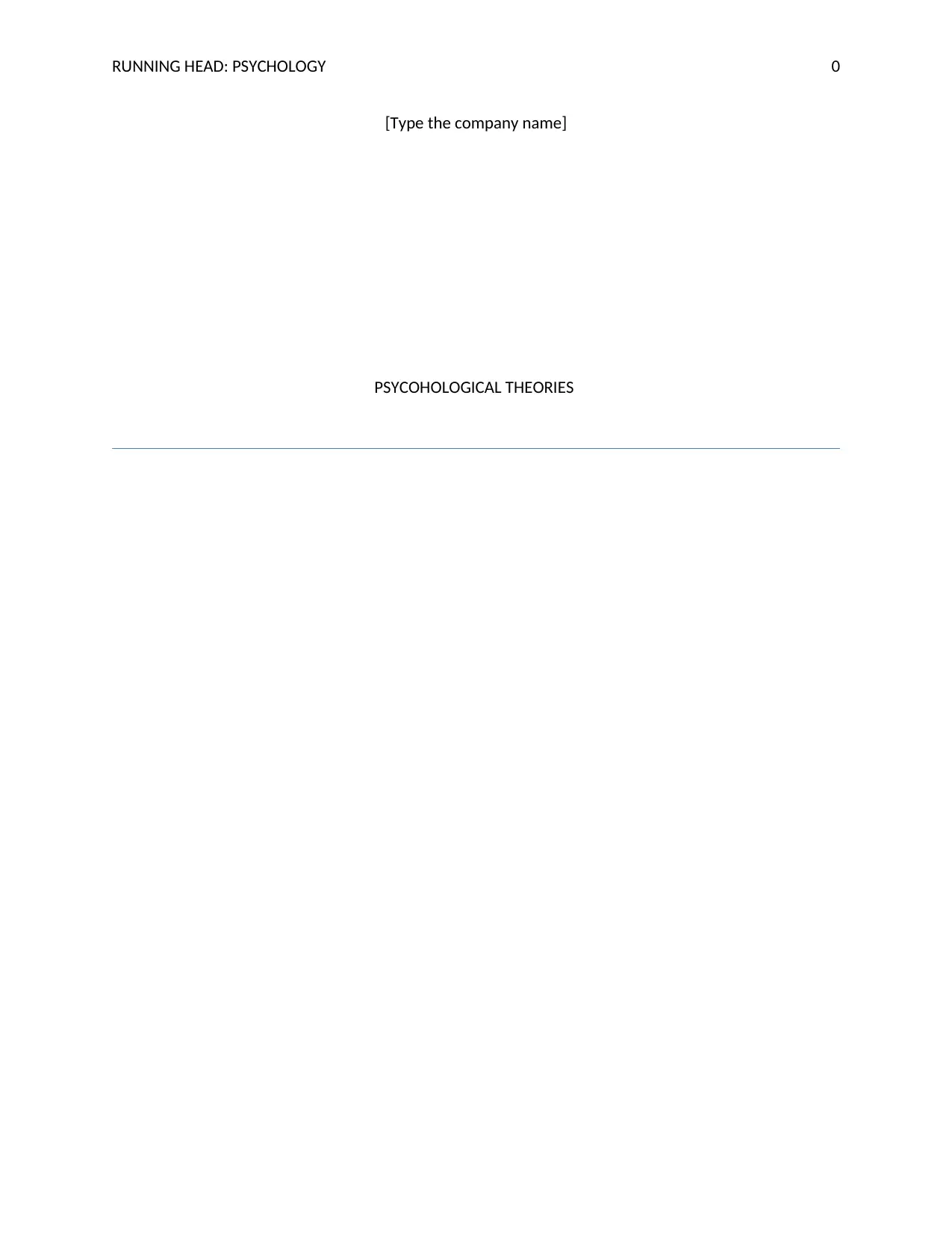
RUNNING HEAD: PSYCHOLOGY 0
[Type the company name]
PSYCOHOLOGICAL THEORIES
[Type the company name]
PSYCOHOLOGICAL THEORIES
Secure Best Marks with AI Grader
Need help grading? Try our AI Grader for instant feedback on your assignments.
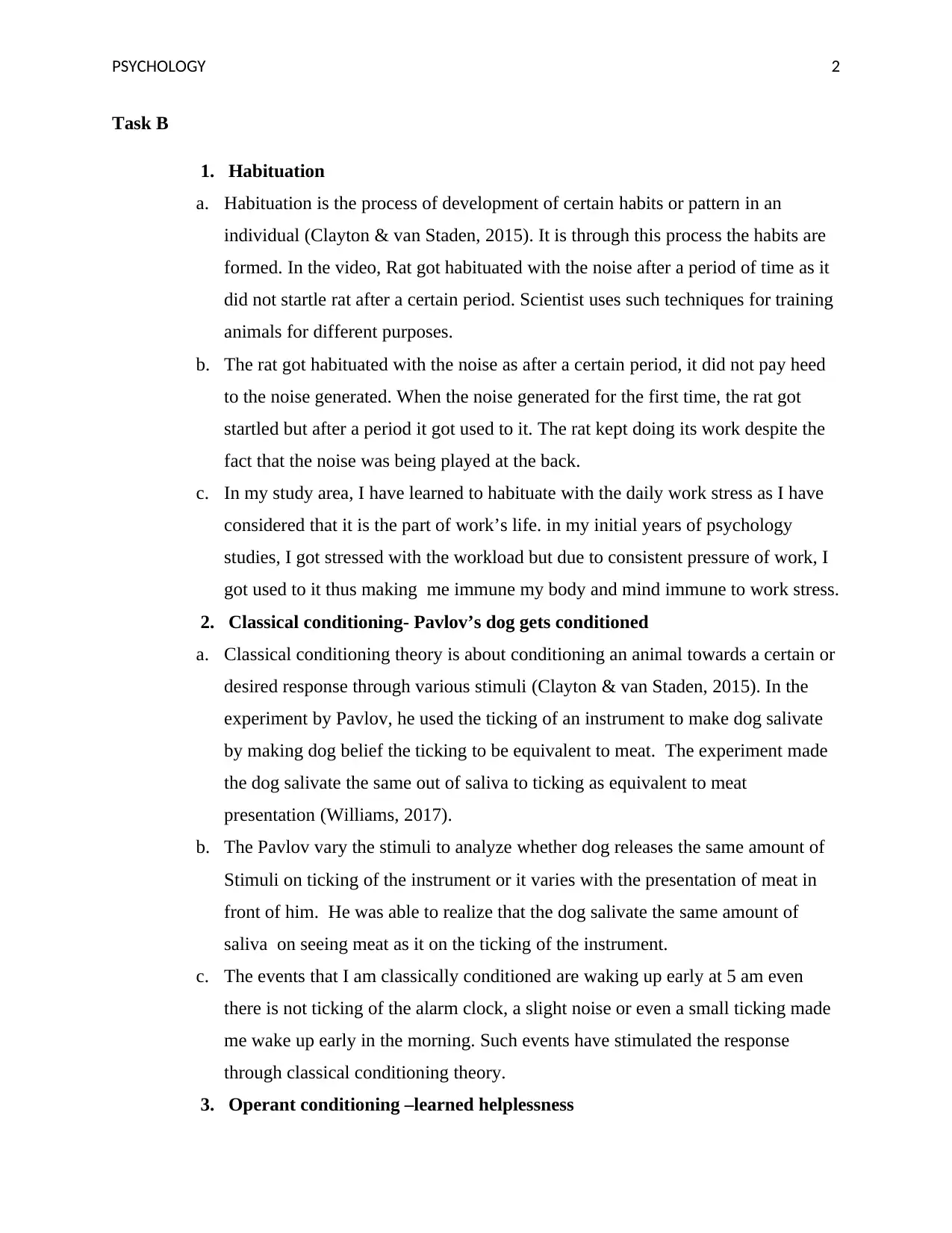
PSYCHOLOGY 2
Task B
1. Habituation
a. Habituation is the process of development of certain habits or pattern in an
individual (Clayton & van Staden, 2015). It is through this process the habits are
formed. In the video, Rat got habituated with the noise after a period of time as it
did not startle rat after a certain period. Scientist uses such techniques for training
animals for different purposes.
b. The rat got habituated with the noise as after a certain period, it did not pay heed
to the noise generated. When the noise generated for the first time, the rat got
startled but after a period it got used to it. The rat kept doing its work despite the
fact that the noise was being played at the back.
c. In my study area, I have learned to habituate with the daily work stress as I have
considered that it is the part of work’s life. in my initial years of psychology
studies, I got stressed with the workload but due to consistent pressure of work, I
got used to it thus making me immune my body and mind immune to work stress.
2. Classical conditioning- Pavlov’s dog gets conditioned
a. Classical conditioning theory is about conditioning an animal towards a certain or
desired response through various stimuli (Clayton & van Staden, 2015). In the
experiment by Pavlov, he used the ticking of an instrument to make dog salivate
by making dog belief the ticking to be equivalent to meat. The experiment made
the dog salivate the same out of saliva to ticking as equivalent to meat
presentation (Williams, 2017).
b. The Pavlov vary the stimuli to analyze whether dog releases the same amount of
Stimuli on ticking of the instrument or it varies with the presentation of meat in
front of him. He was able to realize that the dog salivate the same amount of
saliva on seeing meat as it on the ticking of the instrument.
c. The events that I am classically conditioned are waking up early at 5 am even
there is not ticking of the alarm clock, a slight noise or even a small ticking made
me wake up early in the morning. Such events have stimulated the response
through classical conditioning theory.
3. Operant conditioning –learned helplessness
Task B
1. Habituation
a. Habituation is the process of development of certain habits or pattern in an
individual (Clayton & van Staden, 2015). It is through this process the habits are
formed. In the video, Rat got habituated with the noise after a period of time as it
did not startle rat after a certain period. Scientist uses such techniques for training
animals for different purposes.
b. The rat got habituated with the noise as after a certain period, it did not pay heed
to the noise generated. When the noise generated for the first time, the rat got
startled but after a period it got used to it. The rat kept doing its work despite the
fact that the noise was being played at the back.
c. In my study area, I have learned to habituate with the daily work stress as I have
considered that it is the part of work’s life. in my initial years of psychology
studies, I got stressed with the workload but due to consistent pressure of work, I
got used to it thus making me immune my body and mind immune to work stress.
2. Classical conditioning- Pavlov’s dog gets conditioned
a. Classical conditioning theory is about conditioning an animal towards a certain or
desired response through various stimuli (Clayton & van Staden, 2015). In the
experiment by Pavlov, he used the ticking of an instrument to make dog salivate
by making dog belief the ticking to be equivalent to meat. The experiment made
the dog salivate the same out of saliva to ticking as equivalent to meat
presentation (Williams, 2017).
b. The Pavlov vary the stimuli to analyze whether dog releases the same amount of
Stimuli on ticking of the instrument or it varies with the presentation of meat in
front of him. He was able to realize that the dog salivate the same amount of
saliva on seeing meat as it on the ticking of the instrument.
c. The events that I am classically conditioned are waking up early at 5 am even
there is not ticking of the alarm clock, a slight noise or even a small ticking made
me wake up early in the morning. Such events have stimulated the response
through classical conditioning theory.
3. Operant conditioning –learned helplessness
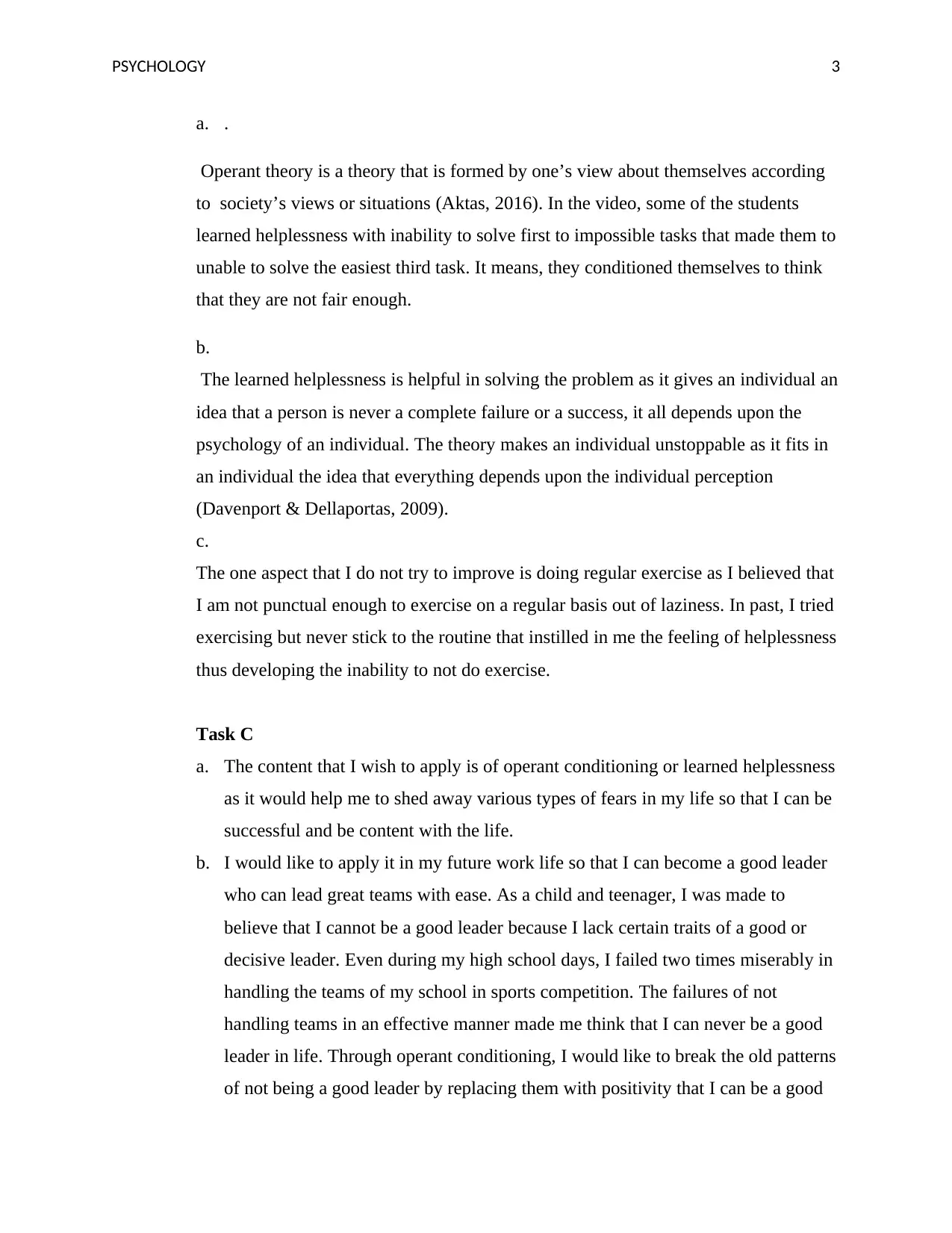
PSYCHOLOGY 3
a. .
Operant theory is a theory that is formed by one’s view about themselves according
to society’s views or situations (Aktas, 2016). In the video, some of the students
learned helplessness with inability to solve first to impossible tasks that made them to
unable to solve the easiest third task. It means, they conditioned themselves to think
that they are not fair enough.
b.
The learned helplessness is helpful in solving the problem as it gives an individual an
idea that a person is never a complete failure or a success, it all depends upon the
psychology of an individual. The theory makes an individual unstoppable as it fits in
an individual the idea that everything depends upon the individual perception
(Davenport & Dellaportas, 2009).
c.
The one aspect that I do not try to improve is doing regular exercise as I believed that
I am not punctual enough to exercise on a regular basis out of laziness. In past, I tried
exercising but never stick to the routine that instilled in me the feeling of helplessness
thus developing the inability to not do exercise.
Task C
a. The content that I wish to apply is of operant conditioning or learned helplessness
as it would help me to shed away various types of fears in my life so that I can be
successful and be content with the life.
b. I would like to apply it in my future work life so that I can become a good leader
who can lead great teams with ease. As a child and teenager, I was made to
believe that I cannot be a good leader because I lack certain traits of a good or
decisive leader. Even during my high school days, I failed two times miserably in
handling the teams of my school in sports competition. The failures of not
handling teams in an effective manner made me think that I can never be a good
leader in life. Through operant conditioning, I would like to break the old patterns
of not being a good leader by replacing them with positivity that I can be a good
a. .
Operant theory is a theory that is formed by one’s view about themselves according
to society’s views or situations (Aktas, 2016). In the video, some of the students
learned helplessness with inability to solve first to impossible tasks that made them to
unable to solve the easiest third task. It means, they conditioned themselves to think
that they are not fair enough.
b.
The learned helplessness is helpful in solving the problem as it gives an individual an
idea that a person is never a complete failure or a success, it all depends upon the
psychology of an individual. The theory makes an individual unstoppable as it fits in
an individual the idea that everything depends upon the individual perception
(Davenport & Dellaportas, 2009).
c.
The one aspect that I do not try to improve is doing regular exercise as I believed that
I am not punctual enough to exercise on a regular basis out of laziness. In past, I tried
exercising but never stick to the routine that instilled in me the feeling of helplessness
thus developing the inability to not do exercise.
Task C
a. The content that I wish to apply is of operant conditioning or learned helplessness
as it would help me to shed away various types of fears in my life so that I can be
successful and be content with the life.
b. I would like to apply it in my future work life so that I can become a good leader
who can lead great teams with ease. As a child and teenager, I was made to
believe that I cannot be a good leader because I lack certain traits of a good or
decisive leader. Even during my high school days, I failed two times miserably in
handling the teams of my school in sports competition. The failures of not
handling teams in an effective manner made me think that I can never be a good
leader in life. Through operant conditioning, I would like to break the old patterns
of not being a good leader by replacing them with positivity that I can be a good
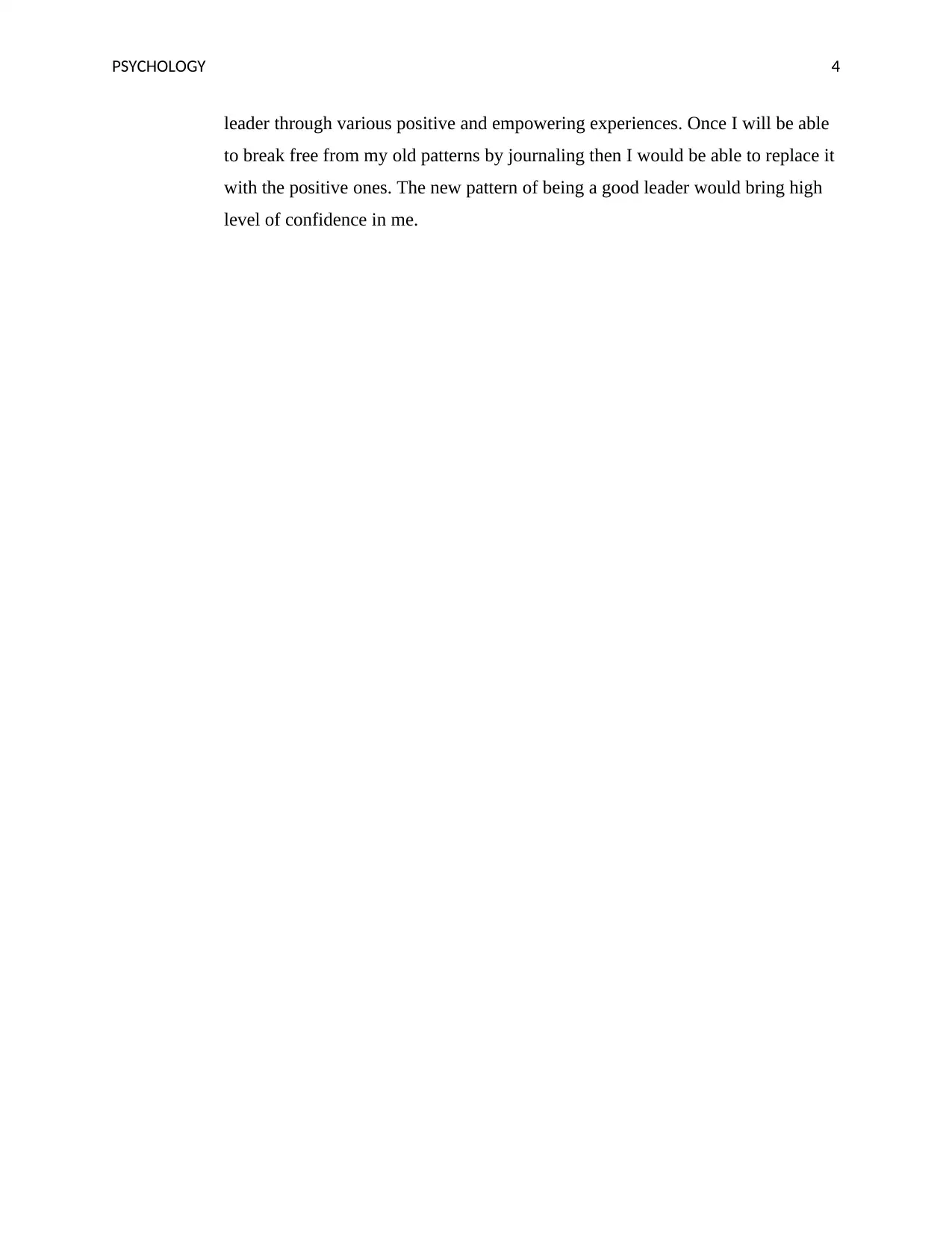
PSYCHOLOGY 4
leader through various positive and empowering experiences. Once I will be able
to break free from my old patterns by journaling then I would be able to replace it
with the positive ones. The new pattern of being a good leader would bring high
level of confidence in me.
leader through various positive and empowering experiences. Once I will be able
to break free from my old patterns by journaling then I would be able to replace it
with the positive ones. The new pattern of being a good leader would bring high
level of confidence in me.
Paraphrase This Document
Need a fresh take? Get an instant paraphrase of this document with our AI Paraphraser
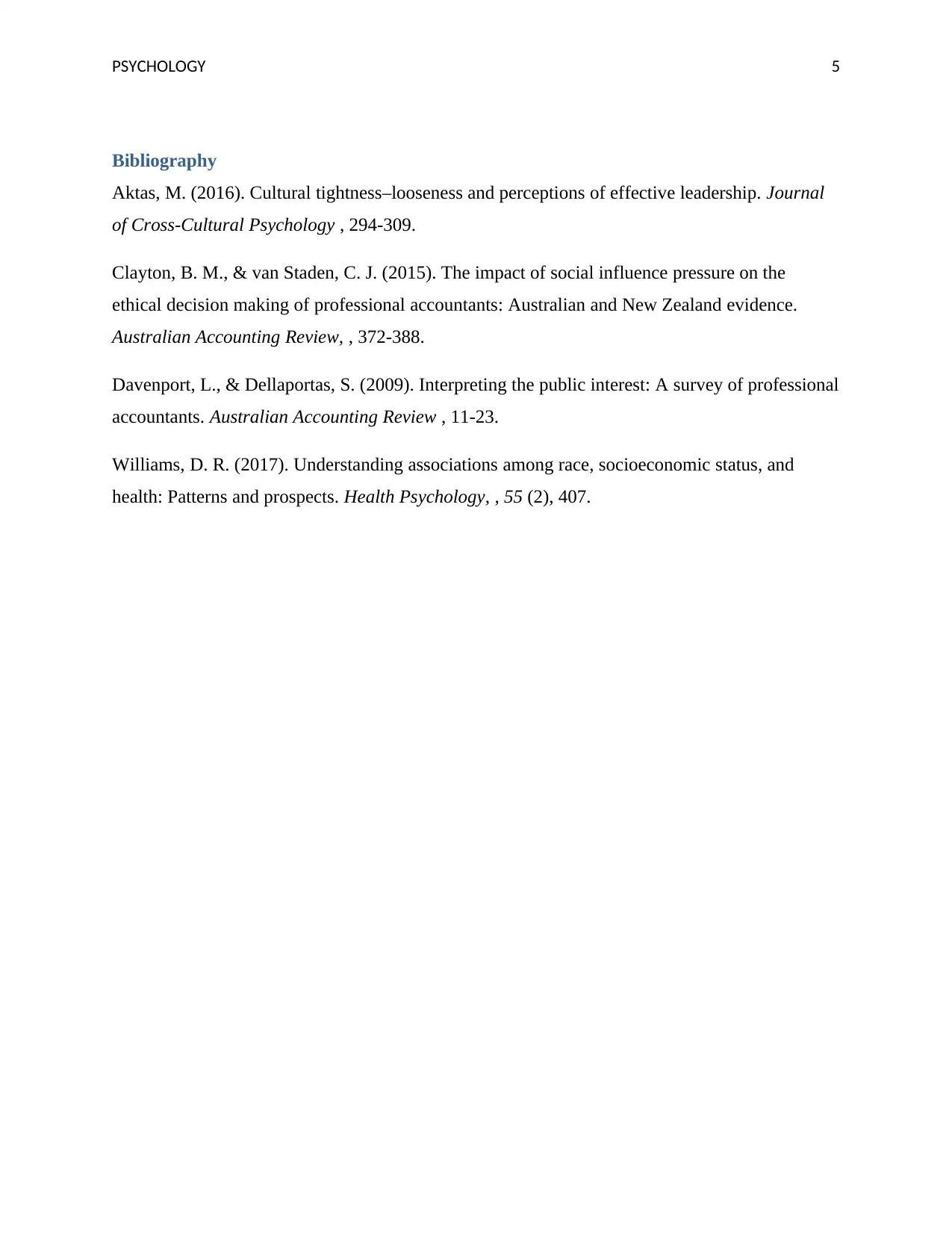
PSYCHOLOGY 5
Bibliography
Aktas, M. (2016). Cultural tightness–looseness and perceptions of effective leadership. Journal
of Cross-Cultural Psychology , 294-309.
Clayton, B. M., & van Staden, C. J. (2015). The impact of social influence pressure on the
ethical decision making of professional accountants: Australian and New Zealand evidence.
Australian Accounting Review, , 372-388.
Davenport, L., & Dellaportas, S. (2009). Interpreting the public interest: A survey of professional
accountants. Australian Accounting Review , 11-23.
Williams, D. R. (2017). Understanding associations among race, socioeconomic status, and
health: Patterns and prospects. Health Psychology, , 55 (2), 407.
Bibliography
Aktas, M. (2016). Cultural tightness–looseness and perceptions of effective leadership. Journal
of Cross-Cultural Psychology , 294-309.
Clayton, B. M., & van Staden, C. J. (2015). The impact of social influence pressure on the
ethical decision making of professional accountants: Australian and New Zealand evidence.
Australian Accounting Review, , 372-388.
Davenport, L., & Dellaportas, S. (2009). Interpreting the public interest: A survey of professional
accountants. Australian Accounting Review , 11-23.
Williams, D. R. (2017). Understanding associations among race, socioeconomic status, and
health: Patterns and prospects. Health Psychology, , 55 (2), 407.
1 out of 5
![[object Object]](/_next/static/media/star-bottom.7253800d.svg)